Organised by Soroptimist International (SI), ‘Opening the Door to Economic Empowerment for Women and Girls’ took place on Wednesday 15 March at 10:30am, in the Hardin Room, Church Centre. Recognising that advancing women’s economic empowerment in the world of work is essential for achieving gender equality, this event took a closer look at each of the four Soroptimist Federations and a variety of Soroptimist grassroot employment projects from around the world. Demonstrating how SI transforms communities through educating, empowering and enabling women and girls, the event was co-sponsored by Zonta International and moderated by Sonja Hönig Schough, President, Zonta International and Zonta International Foundation.
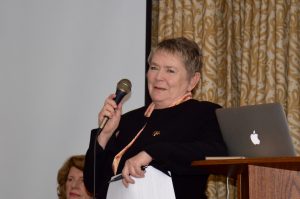
Moderator Sonja Hönig Schough, President, Zonta International and Zonta International Foundation
SI United Nations Representative, New York, Marie D’Amato-Rizzi was in the audience and says: “Wednesday morning at CSW, after our snow day, women and men gathered at the Soroptimist event ‘Opening the Door to Economic Empowerment for Women and Girls’. With a capacity of 53, every seat in the room was filled, with probably the same number standing. Throughout the hour and a half of presentations, you could hear a pin drop. Everyone was riveted whilst Soroptimists from each of the Federations spoke about the work and projects in their clubs.”
RoseMary Reid, President of Soroptimist International of the Americas, spoke of the SIA vision: ‘Women and girls have the resources and opportunities to reach their full potential and live their dreams’. Rosemary introduced the audience to the Soroptimist Live Your Dream Awards (formerly the Women’s Opportunity Awards), which assists women who provide the primary source of financial support for their families, by giving them the resources they need to improve their education, skills and employment prospects.
Each year, almost $2 million in education grants is awarded to more than 1,300 women, many of whom have overcome enormous obstacles including poverty, domestic violence and/or drug and alcohol abuse. Live Your Dream Awards recipients, may use the cash award to offset any costs associated with their efforts to attain higher education, such as books, childcare, tuition and transportation. Results show an 82% increase in standard of living, a 98% increase in self esteem, and 97% becoming role models for their children.
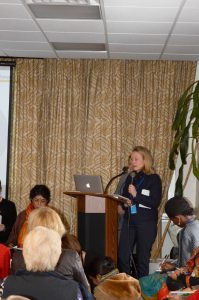
Sigrid Ag, Soroptimist International of Europe Vice President of Advocacy
Sigrid Ag, Vice President of Advocacy, Soroptimist International of Europe,(SIE) explained how SIE initiates, supports, finances and implements well over 4,000 projects each year, with a focus on Education, Economic Empowerment for Women, Violence Against Women, Health and Food Security and Sustainability. Introducing the Soroptimist International of Europe Best Practice Awards 2016, Sigrid spoke about the winner of the Federation’s Economic Empowerment Category; ‘Empowering Bollate’s Female Convicts’, a project by SI Club Merate, Italy. Women who have spent long stretches of time in prison often struggle to find employment once they are released. This can in part be remedied if the time they spend in prison allows them to learn a new skill. Education and learning can also be used to change attitudes and deter women from further criminal activity. With this in mind, the Soroptimst Club of Merate in Italy created the ‘Navicella’ project which seeks to educate female prisoners in the prison in Bollate by teaching them new skills. The Club identified a suitable space inside the prison, renovated it as a library and then donated books, e-books and technical equipment such as a TV and a DVD player.
In addition, the Club organised monthly meetings with female prisoners to discuss women’s living conditions in general. They also sponsored Bollate’s tailoring school, which, in collaboration with the Ilaria Fendi brand, teaches female prisoners how to make bags. Last but not least, the Merate Club sponsored female prisoners to get involved in ABC Catering, an initiative founded by male Bollate prisoners. ABC Catering provides an excellent catering service and runs an acclaimed restaurant called ‘In Galera’. Sigrid introduced SIE’s Immediate Past President, Ulla Madsen, who was in the audience for the event. Ulla had visited Bollate prison and was greatly impressed by the female prisoners’ achievements thus far.
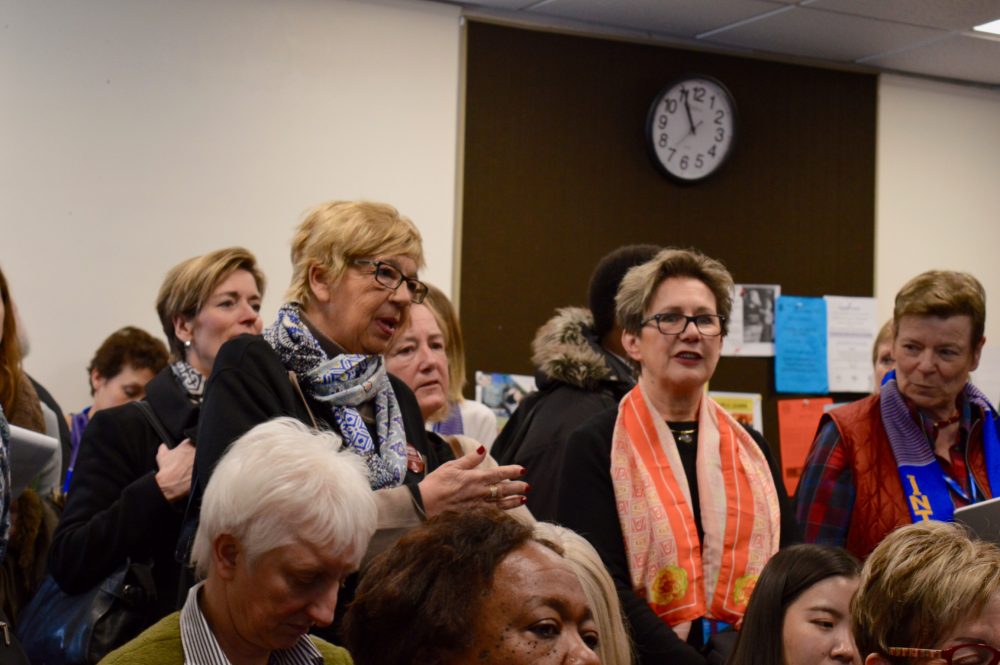
The audience direct questions to the speakers at ‘Opening the Door to Economic Empowerment for Women and Girls’
Nisha Ghosh Soroptimist International Pune Metro East, spoke on behalf of the Soroptimist International of Great Britain & Ireland, and of an enterprise that reached for Economic empowerment – one sanitary napkin at a time.
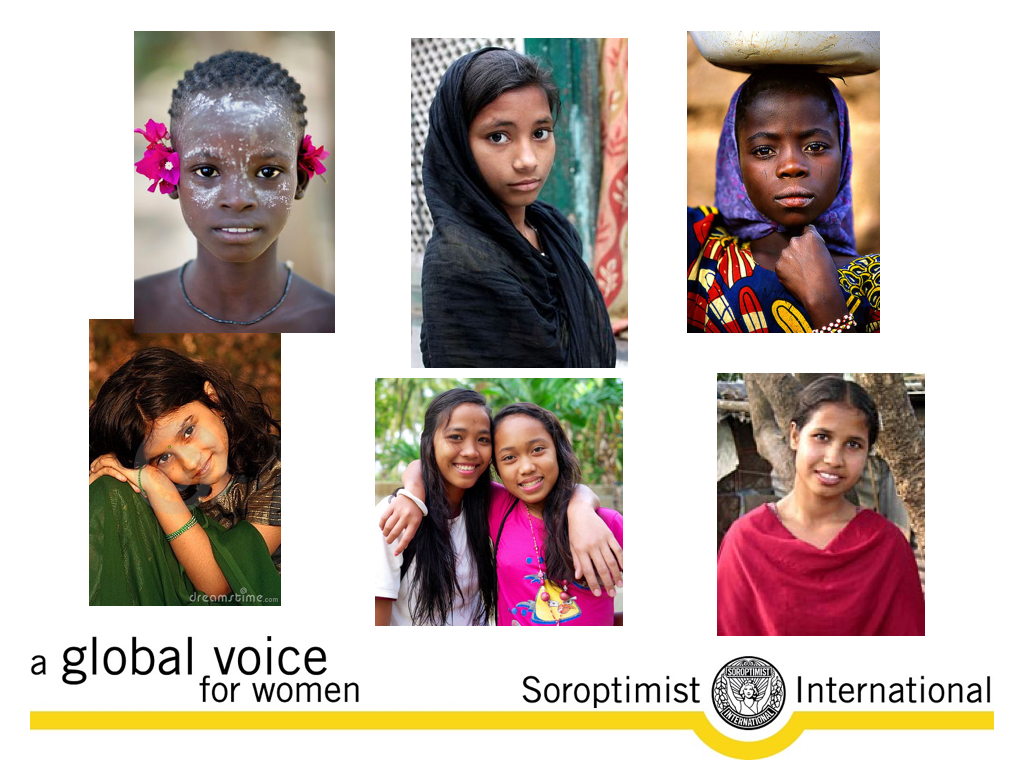
By the age of 11 or 12 these girls all menstruate every month.
Nisha introduced us to seven girls, including Okie from Cameroon, Rani from India, Sultana from Pakistan and Didier from Kenya. What do these young girls have in common? By the age of 11 or 12 they all menstruate every month. These and many other girls are conditioned to believe that menstruation is something to be kept secret, to be ashamed of and to hide—and that menstrual blood is ‘dirty’. Four days of menstruation means the use of cloth, grass, ash, newspaper, dry leaves, often resulting in infection and discomfort. This may also mean loss of school days, or even an end to school attendance. Such social isolation, confusion and loss of dignity, can often result in depression and decreased confidence.
Nisha spoke of the Sanitary Napkin Advocacy Programme (SNAP) and of the 355 million menstruating women in India, only 12 per cent of whom were using sanitary napkins. With half of India made up of women, leaving aside the large cities, only 3% were practicing menstrual hygiene in any form. Most hadn’t heard of, or seen sanitary napkins, and those who had, couldn’t afford to buy them. The success of this enterprise was that it was run by women and for women, ably managed by self help groups and other entrepreneurs. The enterprise used sustainable production of reusable sanitary towels made from recycled cotton material. Interest in the new found industry grew steadily and opportunities for employment for women multiplied as the industry expanded. One machine unit could produce about 40,000 sanitary pads in a month, and the industry generated employment for at least 10 women at each unit. Several units are now set up in 27 Indian states, and others exported to 7 different countries. The average income of women, with no literacy and very few skills, rose to Rs. 2000-3500/month ($30-$52 approx). Such was the success of the enterprise, that governments of some African countries such as Kenya, set goals for free distribution of napkins.
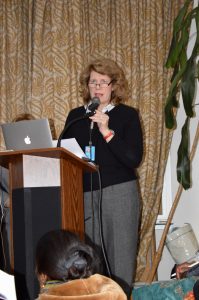
Theresa Lyford, President Soroptimist International of South West Pacific
Theresa Lyford, President of Soroptimist International of South West Pacific, introduced the work of the Federation and a variety of projects that work to empower women economically. With clubs stretching from Mongolia down through parts of Asia, through the Pacific Islands, Australia and New Zealand, Theresa showed photographs much like those seen on the pages of tourist brochures and high end magazines – pictures of beaches, grand architecture, sunshine and sunsets. However Theresa also showed us the contrasting reality for many, which paints a very different picture; one of poverty, isolation and poor working conditions. She spoke of the advantages of empowering women – and how by doing so the next generation will be empowered also.
Theresa said that by empowering women they will no longer be a burden on others; that financial pressures can be shared between the women and men; and the family will be stronger if both parents are empowered. She spoke of ways to reduce poverty – offering women a range of economic and social options, together with the necessary support measures to enhance their capabilities.
Theresa shared Soroptimist International of South West Pacific Club projects such as the Shady Cool Project – a project where SI Ba, Fiji supported a village of single women, divorcees and widows. By building a canteen to sell foods for workers in the area the club offered women a source of income. She spoke of Birthing in the Pacific, a project set up as a response to the high maternal mortality ratio in Papua New Guinea, which went on to become an International President’s Appeal (2011-2013); SEEED – Jobs for life, another highly successful project in Malaysia, and also a project in Mongolia by SI Darkhan. This project sought to improve access to economic empowerment and sustainable opportunities for the employment of women. Analysis showed that vulnerable single mother households would benefit from access to a means of generating income and learning to produce food for sale. The Club negotiated seminars in growing a small business with a government department and selected women attended. Women attended demonstrations in farming techniques in the greenhouses of other women, and learned from others what was needed for small business management. The women were able to exhibit their produce in an exhibition sponsored by the city, and the project now provides farming skills and access to training for small businesses. Previous participants have the opportunity to train others in the skills they have acquired and the women then have a chance to sell their produce and practice small business skills.
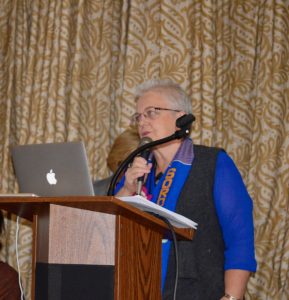
International President, Yvonne Simpson
The final speaker was Soroptimist International President Yvonne Simpson who presented the 2015-2017 President’s Appeal Educate to Lead: Nepal. Yvonne spoke of the key factors for women’s economic empowerment: education; realistic opportunities for employment; leadership training and sustainability. Yvonne from New Zealand, explained that the SI President’s Appeal is launched every two years on Human Rights Day, 10 December, and unites Soroptimists worldwide. Educate to Lead: Nepal, was set up to provide women and girls in Nepal with the education they need to rebuild their lives following the 2015 earthquakes. Reaching the most vulnerable, Yvonne, shared details of her own experiences during the earthquake in Christchurch, New Zealand, 2011 and the wonderful projects and programmes now supported by the International Appeal.
Supporting the Australian Himalyan Foundation (AHF) Educate to Lead: Nepal aims to improve educational outcomes in the Lower Solu Khumbu (Everest) region, a world away from the popular trekking trails. AHF’s TTQE (Teacher Training & Quality Education) Programme includes support for key teacher workshops to fast track the most able teachers, so they can train other teachers – creating a truly sustainable programme, providing training for 100 teachers. Teachers, local District Education Officers, government representatives and community stakeholders also participate in gender sensitivity training, creating awareness across the region of the gender issues in their communities. Removing Barriers to Education in Nepal is a project in Thulipokhari delivered by Soroptimist International of Truckee Meadows in Reno, Nevada. With a grant from the Educate to Lead: Nepal, SI Truckee Meadows is now removing the barriers to education for a further twenty girls as they move into the dormitory for two years to attend school. Room & board, tuition, books, supplies and uniforms will all be paid; and a micro lending programme is available to them when they finish, allowing them to start a small business.
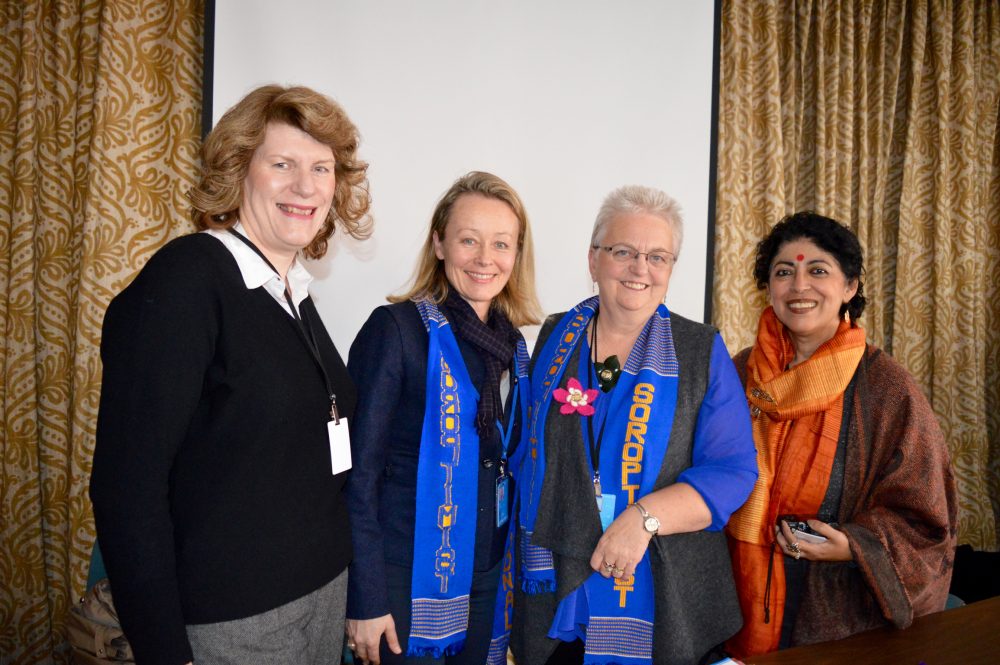
Four of the Panelists, Left to Right: Theresa Lyford, Sigrid Ann Garvie, Yvonne Simpson and Nisha Ghosh
The Tharu Women’s Project is also an ongoing, Soroptimist club project, this time from SI Oita-Midori, of the Japan Minami Region. Educate to Lead: Nepal, supports SI Oita-Midori in delivering computer literacy classes to women and girls. With the purchase of 20 computers, 80 women and 10 teachers are being trained to use the computers during the first two years impacting on opportunities for income generation. The training is set to continue over the coming five years with a final goal of training 200 women. Support from Educate to Lead: Nepal allows Maiti Nepal who has rescued over 29,000 women and girls from the hands of traffickers, to invest in its transit house in Kailali District. Ninety women will benefit directly from room/board, counselling, income generation training & reintegration with many more benefiting indirectly. Yvonne spoke of a mix of exciting new projects and programmes being supported by Educate to Lead: Nepal including Harambee Arts, who provide expressive arts therapy to vulnerable women and girls, including human trafficking survivors; Action Aid, and Days for Girls.
The event was a great success and the audience was given valuable insight into the global work of Soroptimist International and the many grassroot projects that are opening doors to economic empowerment, and transforming communities through educating, empowering and enabling women and girls.

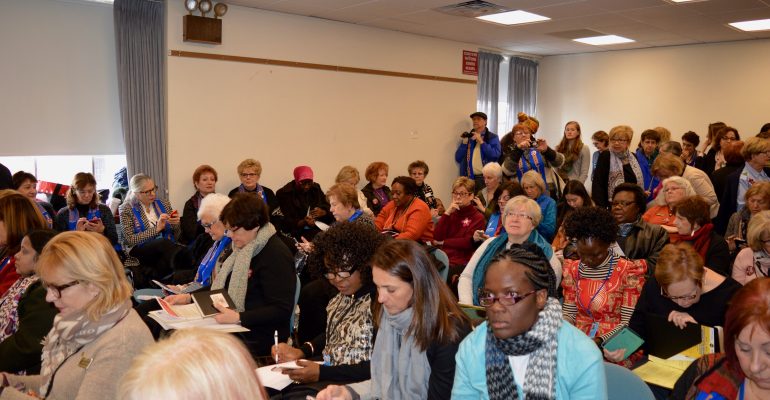
SI Of Fulton-Montgomery Counties (SIA, NAR) is interested in the International sanitary napkin project.
What can a small club do to help?
Cindy Close
SIFMC